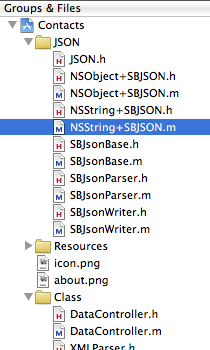- swift和python语法区别_Swift 基本语法
碧色将逝
Swift基本语法在上一章节中我们已经讲到如何创建Swift语言的"Hello,World!"程序。现在我们来复习下。如果创建的是OSXplayground需要引入Cocoa:importCocoa/*我的第一个Swift程序*/varmyString="Hello,World!"print(myString)如果我们想创建iOSplayground则需要引入UIKit:importUIKitva
- 「iOS学习」——Masonry学习
归辞...
ios学习cocoa
iOS学习前言Masonry的属性Masonry的使用基础APIAutoBoxing修饰语倍数中心点设置边距优先级使用总结前言暑假我们学习了使用CocoaPods引入第三方库,实现使用SVG图片。而Masonry作为一个轻量级的布局架构,在使用中可以节省很多时间。故进行简单学习。Masonry的属性UI设计是iOS开发的必须一环,直接影响了app的观感和使用体验。我们通常使用frame框架直接确定
- Xcode 打包报错Command PhaseScriptExecution failed with a nonzero exit code
fendoudexiaoniao_ios
xcodemacoscocoapods
解决办法:1、在Xcode项目中Pods->TargetsSupportFiles->Pods-项目名->Pods-项目名-frameworks中(大约在第44行)加上-f2、CocoaPods版本太旧了,可以尝试升级CocoaPods版本使用sudogemupdatecocoapods更新cocoapods,问题将在1.12.1版本已修复。删除项目根目录下的Podfile.lock、项目名.xc
- $(SRCROOT)和$(PROJECT_DIR)和$(inherited)和${PODS_ROOT}
arcadia188
iOS
$(PROJECT_DIR)代表的是整个项目$(SRCROOT)代表的是项目根目录下左边的animationDemo是PROJECT_DIR右边的animationDemo是SRCROOT$(inherited)是什么?在Xcode项目中很多地方都有$(inherited),$(inherited)的意思就是继承上一级或依赖项的配置。通过CocoaPods集成的项目,$(inherited)将会包
- iOS基础- Framework的CocoaPods制作
jeikerxiao
iosgithub框架库
1.Cocoapods使用podtrunk发布程序2.Framework的CocoaPods制作一、创建自己的github仓库CocoaPods都托管在github上(官方链接为:https://github.com/CocoaPods),所有的Pods依赖库也都依赖github,因此第一步我们需要创建一个属于自己的github仓库。仓库创建界面如下图:说明:Repositoryname仓库名称,
- IOS 15 实现Toast和小菊花Loading提示
sziitjin
IOSios
本文主要是实现toast和loading两种提示功能,例如:登陆时参数不正确提示,toast提示后会自动隐藏。加载提示:不会自动隐藏,常用于网络请求,上传等。添加依赖#提示框架#https://github.com/jdg/MBProgressHUDpod'MBProgressHUD'还不了解如何使用CocoaPods管理依赖的,建议先看前面的文章:IOS01CocoaPods安装与使用添加完依赖
- Cocoa基本原理指南之十一 - Cocoa设计模式
iteye_20746
设计模式移动开发xcode
Cocoa设计模式Cocoa环境的很多架构和机制都有效地使用了设计模式:即为特定上下文中反复出现的问题提供解决方案的抽象设计。Cocoa中设计模式的实现有不同的形式。下面部分中描述的一些设计—比如协议和范畴—是Objective-C语言的特性;在另外一些场合中,“模式的实例”被实现为一个类或一组相关的类(比如类簇和单件类);还有一些场合下,模式表现为一个大的框架结构,比如响应者链模式。抽象工厂模式
- IOS 12 自定义用户协议对话框
sziitjin
IOSios
实现效果实现逻辑本文使用QMUI里面提供的控制器+自定义控件实现。添加依赖#腾讯开源的UI框架,提供了很多功能,例如:圆角按钮,空心按钮,TextView支持placeholder#https://github.com/QMUI/QMUIDemo_iOS#https://qmuiteam.com/ios/get-startedpod"QMUIKit"还不了解如何使用CocoaPods管理依赖的,建
- WebKit的第三方库之CFLite
zjjzcgao
WebKitwebkitpthreadscocoa跨平台url框架
整个WebKit工程包括了很多的第三方库,其中一个是OpenCFLite。OpenCFLite是一种便携式版本的苹果公司的开源CoreFoundation框架。(这句话拷贝自网络。)那么CoreFoundation又是什么呢?CoreFoundation的目的是提供基础数据类型和基本服务,并定义了一套源自于CocoaFoundation的基于C语言的编程接口,比如字符串、日期、数字、URL等。Co
- 如何删除项目中的CocoaPods(iOS开发)
百事星空
这是一个集成了CocoaPods的项目,项目结构如图:pods.png废话不多说,下面就是删除过程:1.删除关与pods的文件,如图:01.png2.删除之后,右键原来的工程,显示包内容,删除与pods相关的那个文件,如图:02-1.png02-2.png3.删除pods相关文件夹03.png4.在target-BuildPhases中删除带有pods的项04.png5.如果还有错误,可以尝试在工
- 【深度学习】COCO API源码解读
CS_Zero
深度学习人工智能
COCOAPI从C、cython,到PythonAPI:实现语义分割标注mask的解析,从具体实现cocoapi/common/maskApi.hcocoapi/common/maskApi.c到Cython封装实现pycocotools._maskcocoapi/PythonAPI/pycocotools/_mask.pyx#distutils:language=c#distutils:sour
- 2021-07-28自建pod库用到的命令
zhangwenqiang
创建工程-podtrunkme:检查自己是否有CocoaPods账号
[email protected]'yourname':注册账号-podlibcreateyourProjectName:创建pod工程创建git仓库//把代码从工作区添加到暂存区$gitadd.//把代码从暂存区添加到本地仓库区$gitcommit-m'InitialKKPodTest’//本
- 使用unity接入admob广告兼容8.0时使用最新aar
voif
如果不用最新的广告库,无法兼容部分8.0如果加过旧的广告库,即使用了最新的unitypackage,给的也是旧版本的aar,并不兼容下面给出解决办法QQ截图20181109125110.png找到这个文件内容如下https://maven.google.com/7.0">https://github.com/CocoaPods/Specscom.google.android.gms:play-se
- 手把手教你环信对接离线推送,再搞不定把你头打掉
前端
前提条件1.macOS系统,安装了xcode,并且配置好了cocoapods第三方管理工具2.有苹果开发者账号3.有环信开发者账号(注册地址:环信即时通讯云)在苹果开发者中心创建项目,注册推送证书.1.登录苹果开发者中心.AppleDeveloper(请用自己的苹果开发者账号)编辑编辑2.苹果开发者中心创建-Identifiers.(name-empushdemo)(identifier-com.
- IOS开发进阶学习资料(提升必备)
the_cleaner
ios
最近整理了下IOS学习资料,包含了入门、进阶、性能优化、面试和学习书籍,算是比较全面的,在这里分享给大家,希望对大家有用。先晒出IOS学习路线图,大家照着图谱修炼。学习社区objc中国learnIOSRayWenderlichNSHipsterWeiWang唐巧的博客cocoachina入门系列Casa的PThread多线程课程从零开发一款ios手把手带你构建类今日头条的AppSwift编程从入门
- iOS 系统框架学习(1.系统框架的四个层级)
码上飞
iOS框架iOS框架iOS系统
一整体框架iOS的整体系统框架图如下图所示,iOS的系统架构主要由ApplicationLayer(应用层)、CocoaTouchLayer(触摸层)、MediaLayer(媒体层)、CoreServicesLayer(核心服务层)、CoreOSLayer(核心系统操作层)和TheKernelandDeviceDriverslayer(内核和驱动层)。了解了系统架构,那么每一层的主要功能是什么呢?
- 最新IOS开发学习资料整理(进阶必备)
henhenha
ios
最近整理了下IOS学习资料,包含了入门、进阶、性能优化、面试和学习书籍,算是比较全面的,在这里分享给大家,希望对大家有用。先晒出IOS学习路线图,大家照着图谱修炼。学习社区objc中国learnIOSRayWenderlichNSHipsterWeiWang唐巧的博客cocoachina入门系列Casa的PThread多线程课程从零开发一款ios手把手带你构建类今日头条的AppSwift编程从入门
- iOS 开发必知,常用第三方
WY_260f
写iOS程序的时候往往需要很多第三方框架的支持,可以大大减少工作量,讲重点放在软件本身的逻辑实现上。GitHub里面有大量优秀的第三方框架,而且License对商业很友好。一下摘录一下几乎每个项目都想集成的几个框架。SDWebImageView1.MantleMantle让我们能简化Cocoa和CocoaTouch应用的model层。简单点说,程序中经常要进行网络请求,请求到得一般是json字符串
- 2021-04-15 Apple M1安装cocoapods
牛牛大王奥利给
新公司配了新的mac是M1的处理器,然后配置pods遇到了好多坑,记录下整个过程,希望对后面遇到问题的人有帮助。首先安装homebrew,homebrew3.0.0以后已经兼容了M1的架构,安装路径在/opt/homebrew,intel的安装路径是:/usr/local/Homebrew,这个部分的安装之前查阅了大量的网络资料,最后通过这个文章彻底解决。这里要注意:1、安装中科大的源的时候,执行
- cocoapods 搜索不到最新版的第三方库
无言soul
cocoapods搜索不到最新的第三库,一般有可能是缓存的问题我们可以使用:podrepoupdate--更新本地的缓存。但是有时候,更新了却还是不行,那我们就1.podcacheclean--all2.rm-rf~/Library/Caches/CocoaPods3.podrepoupdate清除所有的缓存,重新建立索引。此时重新搜索就可以了。原文:https://blog.csdn.net/l
- Could not load NIB in bundle: 'NSBundle
杏子_2fd0
当用cocoapod创建一个组件时,在加载xib或者nib的时候总是报“CouldnotloadNIBinbundle:'NSBundle、、、”错误解决方法:1、在AmafirePackage.podspec文件中配置s.resource='Pod/Assets'2,对于xib加载时注册的时候要进行指向,如:letbundle=Bundle(identifier:"org.cocoapods.A
- cocoapods导入第三方库提示RPC failed curl 18 transfer closed with outstanding read data remaining
雪纳瑞的哈士奇
错误提示:error:RPCfailed;curl18transferclosedwithoutstandingreaddataremainingfatal:Theremoteendhungupunexpectedlyfatal:earlyEOFfatal:index-packfailed导致原因:curl的postBuffer默认值太小,需要在终端重新配置这个值解决方案:1、将curl的post
- podspec私有库踩坑记录
会跑的鱼_09
近期公司在持续集成方面投入加大,需要搭建ios自动化打包环境,所以向公司申请了一台iMac做为自动化打包服务器,所有环境都需要从零开始,在配置cocoapods环境时备受挫折,podinstall始终不成功(第一次非常慢),经过无数次失败后最终放弃。最终选择了曲线救国这条道路,搭建私有pod库,把所有第三方开源代码上传到公司内网服务器。至于如何创建私有库大家可以参考使用Cocoapods创建私有p
- Jenkins-jenkins中cocoapods脚本和fastlane脚本
小驴拉磨
image.png1、cocoapods更新三方库脚本echo'///开始更新pod三方库'#根据打印路径决定是否需要cdcdiqhiPadpwd#podsetuppodinstallecho'///更新pod三方库完成'2、fastlane打包的脚本#!/bin/sh#工程名project_name="xxxxx"#scheme名/target名scheme_name="xxxxxx"#打包模式
- iOS一些常用网站
夙挽清歌
1.goole开源http://blog.csdn.net/caisini_vc/article/details/55994682.iOS基础知识http://www.cocoachina.com/bbs/read.php?tid=132401&page=13.OC的缺陷和陷阱http://www.cocoachina.com/ios/20141127/10339.html4.文顶顶博客园http
- maven
EnjoyWT
这家伙可以理解为java版cocoapods,但是maven相对于java的第三方框架来说又和cocoapods相对于插件来说不一样作者写的真详细
- cocoapods-问题收集
Jacob_LJ
Cocoapods最新:2018年06月06日问题:Unabletoruncommand'StripNIBAQPhotoPickerView.nib'-thistargetmightincludeitsownproduct描述:私有库中带有xib文件解决:xib文件与图片文件同属资源文件,需借助s.resource引入修正前:s.source_files="pod/classes/**/*"修正后
- RunLoop 的底层实现
二斤寂寞
RunLoop的核心是基于machport的,其进入休眠时调用的函数是mach_msg()。为了解释这个逻辑,下面稍微介绍一下OSX/iOS的系统架构。image.png苹果官方将整个系统大致划分为上述4个层次:应用层:包括用户能接触到的图形应用,例如Spotlight、Aqua、SpringBoard等。应用框架层:即开发人员接触到的Cocoa等框架。核心框架层:包括各种核心框架、OpenGL等
- iOS开发项目导入已安装的CocoPods出现的错误解决
大信
终端执行podinstall的时候出现RuntimeError-[Xcodeproj]Unknownobjectversion..........[!]Ohno,anerroroccurred.SearchforexistingGitHubissuessimilartoyours:.........可能的问题及解决:1.xcode版本,与现在CocoaPods的版本不匹配终端执行$geminsta
- direct access to Objective-C's isa is deprecated in favor of object_getClass()
我一不小心就
BuildSetting中搜索Directusageof'isa'将YES改为NO本人是CocoaPods引入的JSONKit框架,处理方法如下将pods的targets设置为JSONKit,然后去BuildSetting搜索Directusageof'isa'将YES改为NO
- Maven
Array_06
eclipsejdkmaven
Maven
Maven是基于项目对象模型(POM), 信息来管理项目的构建,报告和文档的软件项目管理工具。
Maven 除了以程序构建能力为特色之外,还提供高级项目管理工具。由于 Maven 的缺省构建规则有较高的可重用性,所以常常用两三行 Maven 构建脚本就可以构建简单的项目。由于 Maven 的面向项目的方法,许多 Apache Jakarta 项目发文时使用 Maven,而且公司
- ibatis的queyrForList和queryForMap区别
bijian1013
javaibatis
一.说明
iBatis的返回值参数类型也有种:resultMap与resultClass,这两种类型的选择可以用两句话说明之:
1.当结果集列名和类的属性名完全相对应的时候,则可直接用resultClass直接指定查询结果类
- LeetCode[位运算] - #191 计算汉明权重
Cwind
java位运算LeetCodeAlgorithm题解
原题链接:#191 Number of 1 Bits
要求:
写一个函数,以一个无符号整数为参数,返回其汉明权重。例如,‘11’的二进制表示为'00000000000000000000000000001011', 故函数应当返回3。
汉明权重:指一个字符串中非零字符的个数;对于二进制串,即其中‘1’的个数。
难度:简单
分析:
将十进制参数转换为二进制,然后计算其中1的个数即可。
“
- 浅谈java类与对象
15700786134
java
java是一门面向对象的编程语言,类与对象是其最基本的概念。所谓对象,就是一个个具体的物体,一个人,一台电脑,都是对象。而类,就是对象的一种抽象,是多个对象具有的共性的一种集合,其中包含了属性与方法,就是属于该类的对象所具有的共性。当一个类创建了对象,这个对象就拥有了该类全部的属性,方法。相比于结构化的编程思路,面向对象更适用于人的思维
- linux下双网卡同一个IP
被触发
linux
转自:
http://q2482696735.blog.163.com/blog/static/250606077201569029441/
由于需要一台机器有两个网卡,开始时设置在同一个网段的IP,发现数据总是从一个网卡发出,而另一个网卡上没有数据流动。网上找了下,发现相同的问题不少:
一、
关于双网卡设置同一网段IP然后连接交换机的时候出现的奇怪现象。当时没有怎么思考、以为是生成树
- 安卓按主页键隐藏程序之后无法再次打开
肆无忌惮_
安卓
遇到一个奇怪的问题,当SplashActivity跳转到MainActivity之后,按主页键,再去打开程序,程序没法再打开(闪一下),结束任务再开也是这样,只能卸载了再重装。而且每次在Log里都打印了这句话"进入主程序"。后来发现是必须跳转之后再finish掉SplashActivity
本来代码:
// 销毁这个Activity
fin
- 通过cookie保存并读取用户登录信息实例
知了ing
JavaScripthtml
通过cookie的getCookies()方法可获取所有cookie对象的集合;通过getName()方法可以获取指定的名称的cookie;通过getValue()方法获取到cookie对象的值。另外,将一个cookie对象发送到客户端,使用response对象的addCookie()方法。
下面通过cookie保存并读取用户登录信息的例子加深一下理解。
(1)创建index.jsp文件。在改
- JAVA 对象池
矮蛋蛋
javaObjectPool
原文地址:
http://www.blogjava.net/baoyaer/articles/218460.html
Jakarta对象池
☆为什么使用对象池
恰当地使用对象池化技术,可以有效地减少对象生成和初始化时的消耗,提高系统的运行效率。Jakarta Commons Pool组件提供了一整套用于实现对象池化
- ArrayList根据条件+for循环批量删除的方法
alleni123
java
场景如下:
ArrayList<Obj> list
Obj-> createTime, sid.
现在要根据obj的createTime来进行定期清理。(释放内存)
-------------------------
首先想到的方法就是
for(Obj o:list){
if(o.createTime-currentT>xxx){
- 阿里巴巴“耕地宝”大战各种宝
百合不是茶
平台战略
“耕地保”平台是阿里巴巴和安徽农民共同推出的一个 “首个互联网定制私人农场”,“耕地宝”由阿里巴巴投入一亿 ,主要是用来进行农业方面,将农民手中的散地集中起来 不仅加大农民集体在土地上面的话语权,还增加了土地的流通与 利用率,提高了土地的产量,有利于大规模的产业化的高科技农业的 发展,阿里在农业上的探索将会引起新一轮的产业调整,但是集体化之后农民的个体的话语权 将更少,国家应出台相应的法律法规保护
- Spring注入有继承关系的类(1)
bijian1013
javaspring
一个类一个类的注入
1.AClass类
package com.bijian.spring.test2;
public class AClass {
String a;
String b;
public String getA() {
return a;
}
public void setA(Strin
- 30岁转型期你能否成为成功人士
bijian1013
成功
很多人由于年轻时走了弯路,到了30岁一事无成,这样的例子大有人在。但同样也有一些人,整个职业生涯都发展得很优秀,到了30岁已经成为职场的精英阶层。由于做猎头的原因,我们接触很多30岁左右的经理人,发现他们在职业发展道路上往往有很多致命的问题。在30岁之前,他们的职业生涯表现很优秀,但从30岁到40岁这一段,很多人
- [Velocity三]基于Servlet+Velocity的web应用
bit1129
velocity
什么是VelocityViewServlet
使用org.apache.velocity.tools.view.VelocityViewServlet可以将Velocity集成到基于Servlet的web应用中,以Servlet+Velocity的方式实现web应用
Servlet + Velocity的一般步骤
1.自定义Servlet,实现VelocityViewServl
- 【Kafka十二】关于Kafka是一个Commit Log Service
bit1129
service
Kafka is a distributed, partitioned, replicated commit log service.这里的commit log如何理解?
A message is considered "committed" when all in sync replicas for that partition have applied i
- NGINX + LUA实现复杂的控制
ronin47
lua nginx 控制
安装lua_nginx_module 模块
lua_nginx_module 可以一步步的安装,也可以直接用淘宝的OpenResty
Centos和debian的安装就简单了。。
这里说下freebsd的安装:
fetch http://www.lua.org/ftp/lua-5.1.4.tar.gz
tar zxvf lua-5.1.4.tar.gz
cd lua-5.1.4
ma
- java-14.输入一个已经按升序排序过的数组和一个数字, 在数组中查找两个数,使得它们的和正好是输入的那个数字
bylijinnan
java
public class TwoElementEqualSum {
/**
* 第 14 题:
题目:输入一个已经按升序排序过的数组和一个数字,
在数组中查找两个数,使得它们的和正好是输入的那个数字。
要求时间复杂度是 O(n) 。如果有多对数字的和等于输入的数字,输出任意一对即可。
例如输入数组 1 、 2 、 4 、 7 、 11 、 15 和数字 15 。由于
- Netty源码学习-HttpChunkAggregator-HttpRequestEncoder-HttpResponseDecoder
bylijinnan
javanetty
今天看Netty如何实现一个Http Server
org.jboss.netty.example.http.file.HttpStaticFileServerPipelineFactory:
pipeline.addLast("decoder", new HttpRequestDecoder());
pipeline.addLast(&quo
- java敏感词过虑-基于多叉树原理
cngolon
违禁词过虑替换违禁词敏感词过虑多叉树
基于多叉树的敏感词、关键词过滤的工具包,用于java中的敏感词过滤
1、工具包自带敏感词词库,第一次调用时读入词库,故第一次调用时间可能较长,在类加载后普通pc机上html过滤5000字在80毫秒左右,纯文本35毫秒左右。
2、如需自定义词库,将jar包考入WEB-INF工程的lib目录,在WEB-INF/classes目录下建一个
utf-8的words.dict文本文件,
- 多线程知识
cuishikuan
多线程
T1,T2,T3三个线程工作顺序,按照T1,T2,T3依次进行
public class T1 implements Runnable{
@Override
- spring整合activemq
dalan_123
java spring jms
整合spring和activemq需要搞清楚如下的东东1、ConnectionFactory分: a、spring管理连接到activemq服务器的管理ConnectionFactory也即是所谓产生到jms服务器的链接 b、真正产生到JMS服务器链接的ConnectionFactory还得
- MySQL时间字段究竟使用INT还是DateTime?
dcj3sjt126com
mysql
环境:Windows XPPHP Version 5.2.9MySQL Server 5.1
第一步、创建一个表date_test(非定长、int时间)
CREATE TABLE `test`.`date_test` (`id` INT NOT NULL AUTO_INCREMENT ,`start_time` INT NOT NULL ,`some_content`
- Parcel: unable to marshal value
dcj3sjt126com
marshal
在两个activity直接传递List<xxInfo>时,出现Parcel: unable to marshal value异常。 在MainActivity页面(MainActivity页面向NextActivity页面传递一个List<xxInfo>): Intent intent = new Intent(this, Next
- linux进程的查看上(ps)
eksliang
linux pslinux ps -llinux ps aux
ps:将某个时间点的进程运行情况选取下来
转载请出自出处:http://eksliang.iteye.com/admin/blogs/2119469
http://eksliang.iteye.com
ps 这个命令的man page 不是很好查阅,因为很多不同的Unix都使用这儿ps来查阅进程的状态,为了要符合不同版本的需求,所以这个
- 为什么第三方应用能早于System的app启动
gqdy365
System
Android应用的启动顺序网上有一大堆资料可以查阅了,这里就不细述了,这里不阐述ROM启动还有bootloader,软件启动的大致流程应该是启动kernel -> 运行servicemanager 把一些native的服务用命令启动起来(包括wifi, power, rild, surfaceflinger, mediaserver等等)-> 启动Dalivk中的第一个进程Zygot
- App Framework发送JSONP请求(3)
hw1287789687
jsonp跨域请求发送jsonpajax请求越狱请求
App Framework 中如何发送JSONP请求呢?
使用jsonp,详情请参考:http://json-p.org/
如何发送Ajax请求呢?
(1)登录
/***
* 会员登录
* @param username
* @param password
*/
var user_login=function(username,password){
// aler
- 发福利,整理了一份关于“资源汇总”的汇总
justjavac
资源
觉得有用的话,可以去github关注:https://github.com/justjavac/awesome-awesomeness-zh_CN 通用
free-programming-books-zh_CN 免费的计算机编程类中文书籍
精彩博客集合 hacke2/hacke2.github.io#2
ResumeSample 程序员简历
- 用 Java 技术创建 RESTful Web 服务
macroli
java编程WebREST
转载:http://www.ibm.com/developerworks/cn/web/wa-jaxrs/
JAX-RS (JSR-311) 【 Java API for RESTful Web Services 】是一种 Java™ API,可使 Java Restful 服务的开发变得迅速而轻松。这个 API 提供了一种基于注释的模型来描述分布式资源。注释被用来提供资源的位
- CentOS6.5-x86_64位下oracle11g的安装详细步骤及注意事项
超声波
oraclelinux
前言:
这两天项目要上线了,由我负责往服务器部署整个项目,因此首先要往服务器安装oracle,服务器本身是CentOS6.5的64位系统,安装的数据库版本是11g,在整个的安装过程中碰到很多的坑,不过最后还是通过各种途径解决并成功装上了。转别写篇博客来记录完整的安装过程以及在整个过程中的注意事项。希望对以后那些刚刚接触的菜鸟们能起到一定的帮助作用。
安装过程中可能遇到的问题(注
- HttpClient 4.3 设置keeplive 和 timeout 的方法
supben
httpclient
ConnectionKeepAliveStrategy kaStrategy = new DefaultConnectionKeepAliveStrategy() {
@Override
public long getKeepAliveDuration(HttpResponse response, HttpContext context) {
long keepAlive
- Spring 4.2新特性-@Import注解的升级
wiselyman
spring 4
3.1 @Import
@Import注解在4.2之前只支持导入配置类
在4.2,@Import注解支持导入普通的java类,并将其声明成一个bean
3.2 示例
演示java类
package com.wisely.spring4_2.imp;
public class DemoService {
public void doSomethin
